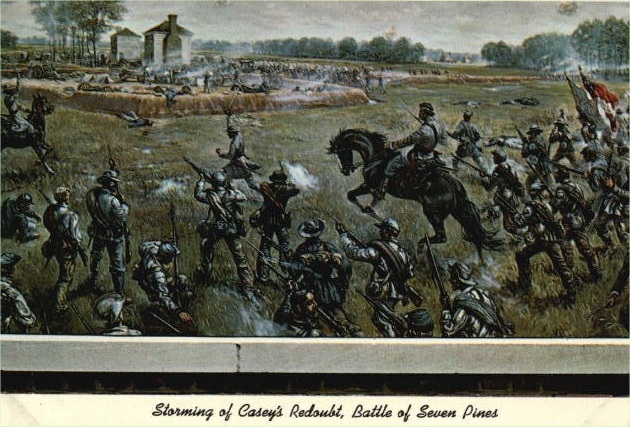REAL News for REAL People
Intention And Result at Seven Pines
Publisher's note: The article below appeared in John Hood's daily column in his publication, the Carolina Journal, which, because of Author / Publisher Hood, is inextricably linked to the John Locke Foundation.
RALEIGH Today is the sesquicentennial of the first day of the Battle of Seven Pines. It was a key moment in the brief history of the Confederate States of America, the long history of the United States of America, and the very long history of unintended consequences.
Confederate Gen. Joseph E. Johnston had the right intention when initiating the battle, which lasted two days. Union Gen. George B. McClellan had initially landed his numerically superior force at the tip of the Virginia Peninsula in March 1862. McClellan's goal was to move his forces up the peninsula to the northwest, defeat any Confederate armies that stood in his way, and capture the capital city of Richmond.
But a combination of valiant Confederate defenses and Johnston's skillful, orderly retreats in front of the advancing Union columns had served to make McClellan increasingly nervous about his Peninsula Campaign. He began to imagine that his Confederate adversaries outnumbered him, that he needed more men and supplies, and that the campaign would take far longer than he originally planned.
McClellan's fantasies gave the Confederates a useful assist, but they didn't change the facts on the ground. The Union forces were numerically superior. And while Johnston had proved himself good at orderly retreats - not just during this campaign but throughout the war - they would not ensure victory for the Confederacy. If he retreated all the way into Richmond, Johnston knew that a siege would follow. The prospect of surviving it was dim.
So Johnston decided to attack. That was the right decision. But he bungled both his battle plan and his instructions to subordinates, including Gen. James Longstreet. The plan was too complicated to be executed effectively by what was still a largely inexperienced Army of Northern Virginia. The Confederate attacks ended up in the wrong place at the wrong time. And some of the divisional officers didn't realize Longstreet was supposed to be in tactical command of the main thrust.

Neither of the opposing commanders, Johnston and McClellan, really knew what was going on during most of the first day of the battle, May 31. Despite the ragged nature of their assaults, the Confederates had some initial successes. Late in the afternoon, Johnston figured out what was happening and led the Confederate reserve into the fray. These units were then hit by a sizable Union counterattack near Fair Oaks Station.
I have a particular interest in two of the five Confederate brigades involved in the Fair Oaks firefight. One was the Texas Brigade, led by Gen. John B. Hood, a cousin of mine. The other was the brigade led by Gen. Johnston Pettigrew, a North Carolina native whose regiments included the 22nd North Carolina. My great-great grandfather, Wilburn Suddreth, was a lieutenant in the 22nd North Carolina. My great-great uncle, Gaston Hood, was a sergeant in Suddreth's company.
The fighting at Fair Oaks Station was bloody. One of the Union's brigade commanders was wounded. Three of the Confederate's brigade commanders were also killed or wounded, including Pettigrew. The 22nd North Carolina sustained about 200 casualties, including Lt. Suddreth, shot in the shoulder and involuntarily retired from service as a result. Gaston Hood survived the battle intact but was killed a few weeks later during the subsequent Seven Days series of battles near Richmond.
Hood didn't die under Johnston's command, however. This is what made the battle of Seven Pines (or Fair Oaks, as the Yankees called it) so significant. The outcome was inconclusive from a tactical standpoint. But near the end of the fighting, Gen. Johnston was himself seriously wounded in the shoulder and chest. After Johnston's removal to Richmond, Confederate President Jefferson Davis had to choose a replacement to lead the Confederate armies defending the capital. He chose Robert E. Lee - who proved to be a more successful commander. Lee's Seven Days campaign in late June 1862, while costly, broke the Union advance and caused McClellan to lose his nerve. Richmond was saved, and the war prolonged.
In a sense, Johnston's attack at Seven Pines accomplished its objective. But it did so in a manner he couldn't have anticipated: By getting himself replaced with a better leader.
Go Back
RALEIGH Today is the sesquicentennial of the first day of the Battle of Seven Pines. It was a key moment in the brief history of the Confederate States of America, the long history of the United States of America, and the very long history of unintended consequences.
Confederate Gen. Joseph E. Johnston had the right intention when initiating the battle, which lasted two days. Union Gen. George B. McClellan had initially landed his numerically superior force at the tip of the Virginia Peninsula in March 1862. McClellan's goal was to move his forces up the peninsula to the northwest, defeat any Confederate armies that stood in his way, and capture the capital city of Richmond.
But a combination of valiant Confederate defenses and Johnston's skillful, orderly retreats in front of the advancing Union columns had served to make McClellan increasingly nervous about his Peninsula Campaign. He began to imagine that his Confederate adversaries outnumbered him, that he needed more men and supplies, and that the campaign would take far longer than he originally planned.
McClellan's fantasies gave the Confederates a useful assist, but they didn't change the facts on the ground. The Union forces were numerically superior. And while Johnston had proved himself good at orderly retreats - not just during this campaign but throughout the war - they would not ensure victory for the Confederacy. If he retreated all the way into Richmond, Johnston knew that a siege would follow. The prospect of surviving it was dim.
So Johnston decided to attack. That was the right decision. But he bungled both his battle plan and his instructions to subordinates, including Gen. James Longstreet. The plan was too complicated to be executed effectively by what was still a largely inexperienced Army of Northern Virginia. The Confederate attacks ended up in the wrong place at the wrong time. And some of the divisional officers didn't realize Longstreet was supposed to be in tactical command of the main thrust.

Neither of the opposing commanders, Johnston and McClellan, really knew what was going on during most of the first day of the battle, May 31. Despite the ragged nature of their assaults, the Confederates had some initial successes. Late in the afternoon, Johnston figured out what was happening and led the Confederate reserve into the fray. These units were then hit by a sizable Union counterattack near Fair Oaks Station.
I have a particular interest in two of the five Confederate brigades involved in the Fair Oaks firefight. One was the Texas Brigade, led by Gen. John B. Hood, a cousin of mine. The other was the brigade led by Gen. Johnston Pettigrew, a North Carolina native whose regiments included the 22nd North Carolina. My great-great grandfather, Wilburn Suddreth, was a lieutenant in the 22nd North Carolina. My great-great uncle, Gaston Hood, was a sergeant in Suddreth's company.
The fighting at Fair Oaks Station was bloody. One of the Union's brigade commanders was wounded. Three of the Confederate's brigade commanders were also killed or wounded, including Pettigrew. The 22nd North Carolina sustained about 200 casualties, including Lt. Suddreth, shot in the shoulder and involuntarily retired from service as a result. Gaston Hood survived the battle intact but was killed a few weeks later during the subsequent Seven Days series of battles near Richmond.
Hood didn't die under Johnston's command, however. This is what made the battle of Seven Pines (or Fair Oaks, as the Yankees called it) so significant. The outcome was inconclusive from a tactical standpoint. But near the end of the fighting, Gen. Johnston was himself seriously wounded in the shoulder and chest. After Johnston's removal to Richmond, Confederate President Jefferson Davis had to choose a replacement to lead the Confederate armies defending the capital. He chose Robert E. Lee - who proved to be a more successful commander. Lee's Seven Days campaign in late June 1862, while costly, broke the Union advance and caused McClellan to lose his nerve. Richmond was saved, and the war prolonged.
In a sense, Johnston's attack at Seven Pines accomplished its objective. But it did so in a manner he couldn't have anticipated: By getting himself replaced with a better leader.
Latest Body & Soul
|
The campaign for former President Donald Trump released a statement Saturday afternoon condemning the White House’s declaration of Easter Sunday as “Transgender Day of Visibility.”
Published: Thursday, April 4th, 2024 @ 1:31 pm
By: Daily Wire
|
|
He is risen!
Published: Saturday, March 30th, 2024 @ 8:06 pm
By: Stan Deatherage
|
|
The great misnomer for non Christians that the day Jesus Christ was executed by occupying Romans, celebrated by Christians as "Good" Friday, must be a paradox of ominous proportions.
Published: Saturday, March 30th, 2024 @ 7:52 pm
By: Stan Deatherage
|
|
The North Carolina Department of Health and Human Services is launching a Community Partner Engagement Plan to ensure the voices of North Carolina communities and families continue to be at the center of the department’s work.
Published: Tuesday, March 26th, 2024 @ 2:43 pm
By: Eastern NC NOW Staff
|
|
The North Carolina Department of Health and Human Services will host a live Spanish-language Cafecito and tele-town hall on Tuesday, Feb. 27, from 6 to 7 p.m., to discuss how to support and improve heart health as well as prevent and manage heart disease.
Published: Saturday, March 23rd, 2024 @ 8:56 pm
By: Eastern NC NOW Staff
|
|
Part of ongoing effort to raise awareness and combat rising congenital syphilis cases
Published: Saturday, March 23rd, 2024 @ 6:18 pm
By: Eastern NC NOW Staff
|
|
Recognition affirms ECU Health’s commitment to providing highly-reliable, human-centered care
Published: Wednesday, March 20th, 2024 @ 10:47 pm
By: Eastern NC NOW Staff
|
|
The North Carolina Department of Health and Human Services is launching a new Statewide Peer Warmline on Feb. 20, 2024. The new Peer Warmline will work in tandem with the North Carolina 988 Suicide and Crisis Lifeline by giving callers the option to speak with a Peer Support Specialist.
Published: Wednesday, March 20th, 2024 @ 1:29 am
By: Eastern NC NOW Staff
|
|
A subsidiary of one of the largest health insurance agencies in the U.S. was hit by a cyberattack earlier this week from what it believes is a foreign “nation-state” actor, crippling many pharmacies’ ability to process prescriptions across the country.
Published: Tuesday, March 5th, 2024 @ 1:12 am
By: Daily Wire
|
|
The John Locke Foundation is supporting a New Bern eye surgeon's legal fight against North Carolina's certificate-of-need restrictions on healthcare providers.
Published: Monday, March 4th, 2024 @ 11:08 am
By: Carolina Journal
|
|
Shia LaBeouf received the Sacrament of Confirmation, completing his conversion to Catholicism, on Sunday, and the actor’s confirmation sponsor suggested LaBeouf may become a deacon “in the future.”
Published: Sunday, March 3rd, 2024 @ 2:58 pm
By: Daily Wire
|
|
The North Carolina Department of Health and Human Services today released the following statement on the Trails Carolina investigation:
Published: Sunday, March 3rd, 2024 @ 12:19 pm
By: Eastern NC NOW Staff
|
|
The North Carolina Department of Health and Human Services today released a draft of its 2024-25 Olmstead Plan designed to assist people with disabilities to reside in and experience the full benefit of inclusive communities.
Published: Sunday, March 3rd, 2024 @ 11:36 am
By: Eastern NC NOW Staff
|
























